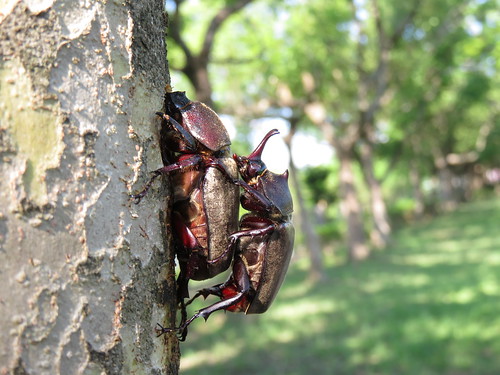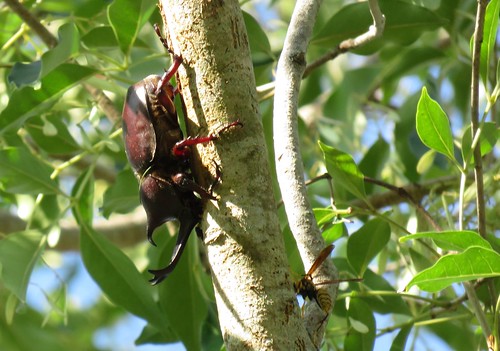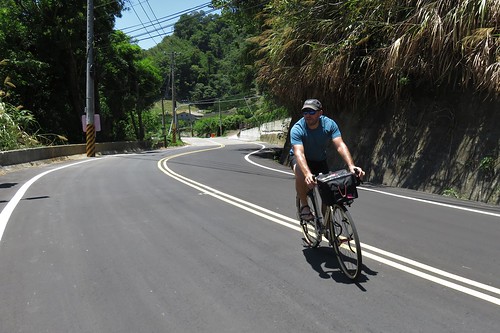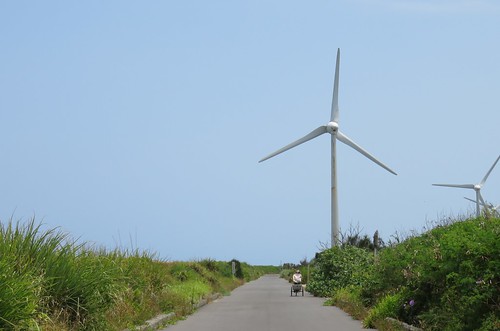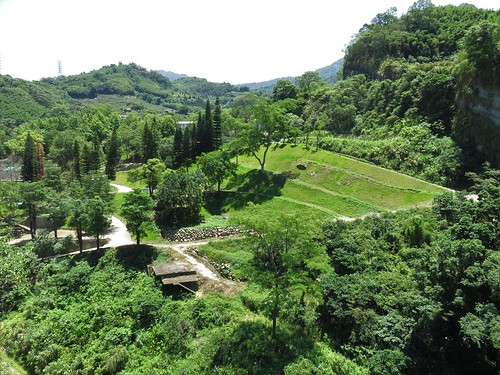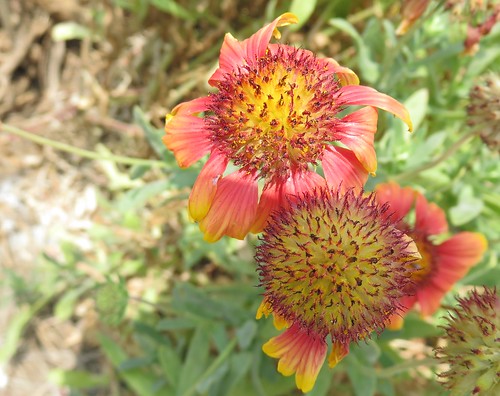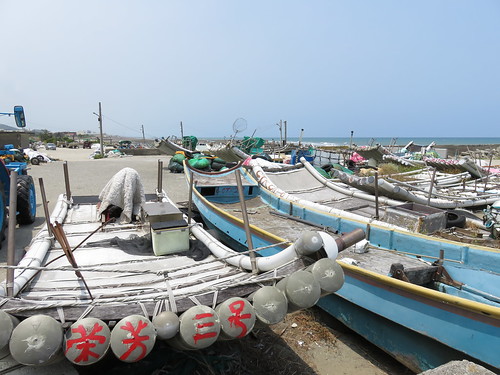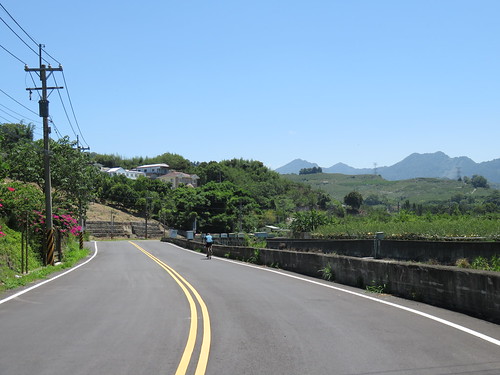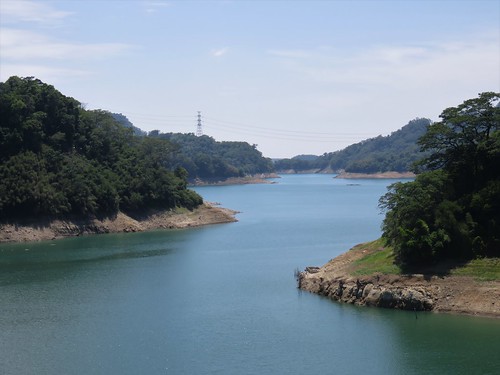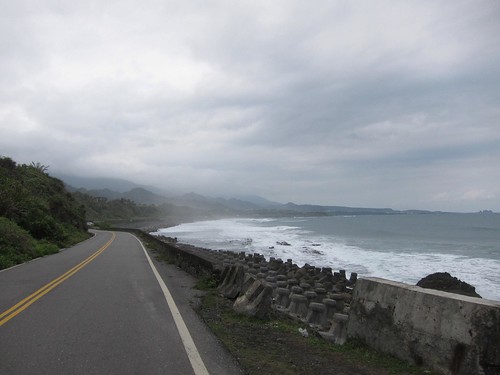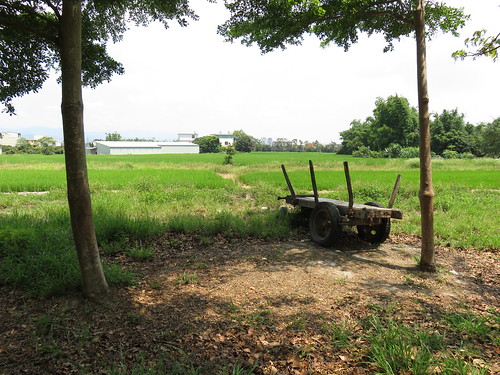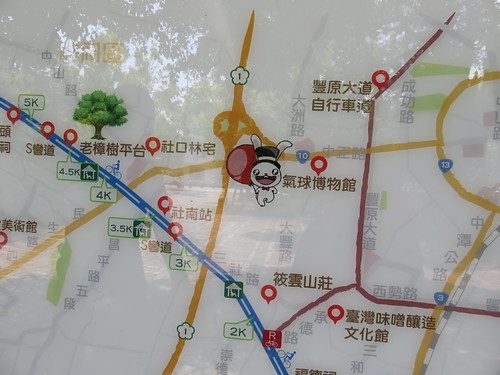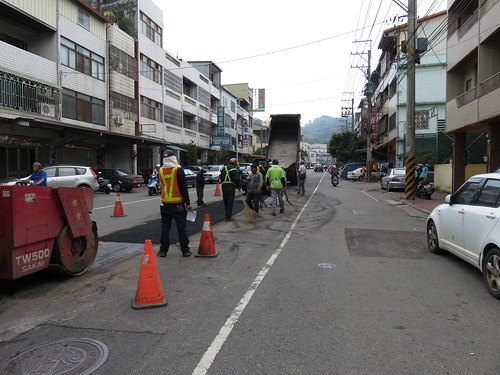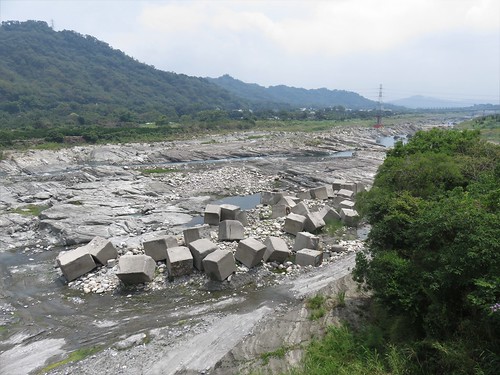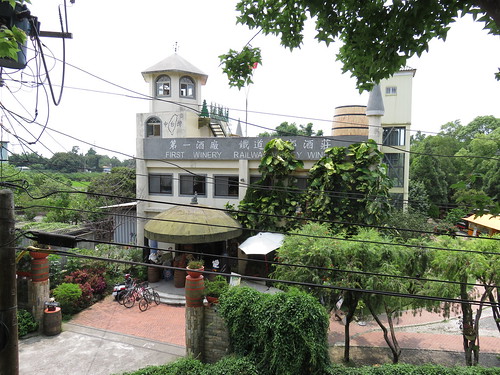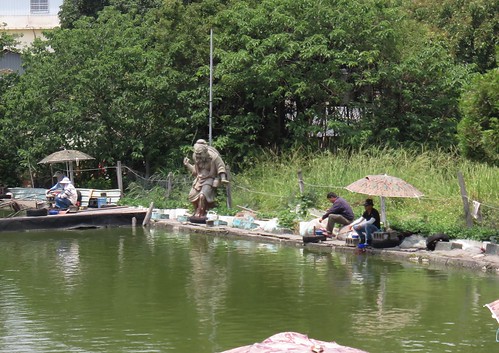Was out today cycling and spotted several trees full of mating beetles. We stopped to get some pics and noticed something interesting...
...wherever there were mating beetles, there were wasps around in the gouges on the bark the beetles create as the mate.
More than one kind of wasp, too. Were they collecting the softened bark to make their nests? Or drinking the sap?
_______________________
[Taiwan] Don't miss the comments below! And check out my blog and its sidebars for events, links to previous posts and picture posts, and scores of links to other Taiwan blogs and forums!
Monday, June 25, 2018
Sunday, June 24, 2018
Whither the Media: Sex and the Media (Note clickbait title!)
My man Dom brakes for a view.
Some of them are very obvious. A couple of years ago China Post shed its staff and went completely digital. I still mourn its death today. Pro-China it may have been, but some of its local reporting was really good and it had a nice set of features and columns, and of course many of the people who worked there were pro-Taiwan.
This same process is now going on at the Taipei Times, I hear. It is funded by the pro-Green Liberty Times group, and is a money loser. I expect at some point that it will move online entirely or even disappear, and all we will be left with for robust English media in Taiwan is Taiwan News and the government news organizations.
Taiwan News underwent several changes. It began as print media, then went totally online. For a while it was a hideous totally online website that sourced all its content from the CNA and was coated with ads. Then it changed to its current more dignified and useful online format and began to operate like a real newspaper.
Taiwan News is owned by a pro-Green business group, and criticism of the DPP there is muted. But it does do some original reporting. Because it is online, it needs to generate clicks, and thus, it puts out lots of clickbait. For example...
Of those, three contain pictures of nude women, blurred over for those who have never seen a nude woman before. The headline about the Taiwanese blogger also notes that the nude wife is in fact his cousin, thus creating a double whammy of nudity-incest titillation. As the local English news media moves online, the amount of tiresome clickbait and worse, clickbait headlines, will rise, but it is a necessary evil from their point of view, because clicks help support their existence.
The article about the British pick up artist is more interesting. I will not provide any links since I do not want to increase their clicks, but these people had long ago declared that Taiwan media are easily scammed, and they ran this latest move of theirs as a scam aimed at the Taiwan media's "they're rogering our wimmenz!" reporting style. Not content with getting into Taiwan News, they also spammed the Taiwan-related Reddits and newsgroups on Facebook with fake news, including obvious garbage claiming that gangsters had killed one of them, and similar. Apparently one of them has scores of fake identities which he uses to troll. Sad.
One of the Facebook groups was Taiwan Daily News in English, which I moderate. Cleaning out the garbage they left on our group, including some sprawling, stupid arguments, sucked.
People like these are essentially parasites, trolling for clickbait, spreading fake news, exploiting the goodwill and hard work of others in building useful web communities, wasting the time and resources of those of us dedicated to fostering such communities, and then declaring themselves superior while leaving better people to clean up the turds they leave behind. Their behaviors are deeply sociopathic. But they are symptomatic of the new media world in which there is so much stuff going on, some of it is fake, and news organizations increasingly lack the resources or skills to determine what is real and what is not. That is going to be an urgent problem for Taiwan's impoverished online media, which cannot even afford routine reporting.
Another problem that the need to generate clickbait is going to exacerbate is the already rampant sexism in Taiwan's media. The pieces featuring nude women in Taiwan News above are only one example. My Twitter feed is filled with gorgeous, partially dressed females tweeted around by Apple Daily, for example, none of them at all news. Even minor fluff pieces like this are fronted with unnecessary images of partially dressed females that are unrelated to the topic at hand.
To get a sense of what is happening, compare the Taiwan News headline about a recent brothel raid in Keelung with the CNA report at Focus Taiwan.
Finally, Taiwan News and the Taipei Times augur an even more serious problem: they are both owned by big companies, which limits the kind of reporting they can do. Since large companies are apt to treat such investments as cost centers, this means that our media institutions, like so many other institutions and vocations in our modern corporate capitalist universe, have become... precarious.
Corporate capitalist ownership of media also leads to another problem: China. David Spencer contended in a recent Taiwan News commentary:
_______________________
[Taiwan] Don't miss the comments below! And check out my blog and its sidebars for events, links to previous posts and picture posts, and scores of links to other Taiwan blogs and forums!
"Manuel, on some subjects I don't trust even myself. Limiting the freedom of news 'just a little bit' is in the same category with the classic example 'a little bit pregnant.' We are not yet free nor will we be as long as anyone--even our ally Mike--controls our news. Someday I hope to own a newspaper independent of any source or channel. I would happily set print by hand, like Benjamin Franklin."Many articles have discussed the problems of journalism in an internet world where digital replication at almost no cost is destroying the scarcity that makes news worth purchasing. In Taiwan this has led to rapid shifts in the English media environment.
Some of them are very obvious. A couple of years ago China Post shed its staff and went completely digital. I still mourn its death today. Pro-China it may have been, but some of its local reporting was really good and it had a nice set of features and columns, and of course many of the people who worked there were pro-Taiwan.
This same process is now going on at the Taipei Times, I hear. It is funded by the pro-Green Liberty Times group, and is a money loser. I expect at some point that it will move online entirely or even disappear, and all we will be left with for robust English media in Taiwan is Taiwan News and the government news organizations.
Taiwan News underwent several changes. It began as print media, then went totally online. For a while it was a hideous totally online website that sourced all its content from the CNA and was coated with ads. Then it changed to its current more dignified and useful online format and began to operate like a real newspaper.
Taiwan News is owned by a pro-Green business group, and criticism of the DPP there is muted. But it does do some original reporting. Because it is online, it needs to generate clicks, and thus, it puts out lots of clickbait. For example...
Of those, three contain pictures of nude women, blurred over for those who have never seen a nude woman before. The headline about the Taiwanese blogger also notes that the nude wife is in fact his cousin, thus creating a double whammy of nudity-incest titillation. As the local English news media moves online, the amount of tiresome clickbait and worse, clickbait headlines, will rise, but it is a necessary evil from their point of view, because clicks help support their existence.
The article about the British pick up artist is more interesting. I will not provide any links since I do not want to increase their clicks, but these people had long ago declared that Taiwan media are easily scammed, and they ran this latest move of theirs as a scam aimed at the Taiwan media's "they're rogering our wimmenz!" reporting style. Not content with getting into Taiwan News, they also spammed the Taiwan-related Reddits and newsgroups on Facebook with fake news, including obvious garbage claiming that gangsters had killed one of them, and similar. Apparently one of them has scores of fake identities which he uses to troll. Sad.
One of the Facebook groups was Taiwan Daily News in English, which I moderate. Cleaning out the garbage they left on our group, including some sprawling, stupid arguments, sucked.
People like these are essentially parasites, trolling for clickbait, spreading fake news, exploiting the goodwill and hard work of others in building useful web communities, wasting the time and resources of those of us dedicated to fostering such communities, and then declaring themselves superior while leaving better people to clean up the turds they leave behind. Their behaviors are deeply sociopathic. But they are symptomatic of the new media world in which there is so much stuff going on, some of it is fake, and news organizations increasingly lack the resources or skills to determine what is real and what is not. That is going to be an urgent problem for Taiwan's impoverished online media, which cannot even afford routine reporting.
Another problem that the need to generate clickbait is going to exacerbate is the already rampant sexism in Taiwan's media. The pieces featuring nude women in Taiwan News above are only one example. My Twitter feed is filled with gorgeous, partially dressed females tweeted around by Apple Daily, for example, none of them at all news. Even minor fluff pieces like this are fronted with unnecessary images of partially dressed females that are unrelated to the topic at hand.
To get a sense of what is happening, compare the Taiwan News headline about a recent brothel raid in Keelung with the CNA report at Focus Taiwan.
CNA: Keelung police crack prostitution ring, 31 arrestedThe CNA article notes that the Thai-ness of the prostitutes was what got the police alerted to the brothel operation, and that they will be deported, but definitely places their origin in the background. Taiwan News moves the Otherness of the prostitutes to the headline and then keeps mentioning their origin in subsequent paragraphs, keeping their Otherness at the center of the reader's attention and muting the involvement of locals. The CNA report is shorter, but it focuses more strongly on the real criminals, the operators of the brothel (you can see why people operate brothels -- the most you can get is two years and the fine for the girls amounts to a weeks' work). The opportunity to troll the audience with Otherness + sex was too good to pass up.
TN: 17 Thai prostitutes nabbed in northern Taiwan's Keelung
Finally, Taiwan News and the Taipei Times augur an even more serious problem: they are both owned by big companies, which limits the kind of reporting they can do. Since large companies are apt to treat such investments as cost centers, this means that our media institutions, like so many other institutions and vocations in our modern corporate capitalist universe, have become... precarious.
Corporate capitalist ownership of media also leads to another problem: China. David Spencer contended in a recent Taiwan News commentary:
Let's take the Taiwanese media as an example. Almost every Taiwanese TV news and print media outlet now has some form of Chinese investment. Many of these financial interests are controlling ones. And the effects this has had on media output in Taiwan has been profound.The "almost every" is patently untrue (Spencer provides no evidence to support this claim), but the core issue of the claim is disturbingly correct -- it is entirely possible for China to purchase influence, especially since the local media is precarious, always a CEO's decision away from being slashed back to nothing. Moreover, many media firms belong to large conglomerates that have investments in China, one reason China encourages Taiwanese investment. A 2014 piece at Thinking Taiwan laid out the consequences:
The evidence Hsu uses to support his research has a broad range. Circulation figures are used to examine market shares of various media, which allows for the further analysis of an outlet’s development trends and changing political orientation. Hsu studies not only the cases involving overtly pro-Beijing and pro-Chinese Nationalist Party (KMT) media such as the Want Want China Times Group, but also others, including Formosa TV (FTV) and SET, which originally sided with the Democratic Progressive Party (DPP) and were Taiwan-centric but later surrendered their political posture to Beijing’s wishes, ostensibly in order to protect their business relations with China. Hsu’s research demonstrates that some traditionally pro-DPP media are engaging in self-censorship under pressure from Beijing, warning signs of deteriorating freedom of the press and speech in Taiwan.Will our English media be able to resist this unrelenting, ever-growing pressure?
.....
Throughout his study, Hsu uses interesting anecdotes as evidence, and a good share of the information is made public for the first time. As mentioned above, an important contribution of this paper is that it does not exclude analysis of media that have upheld a pro-Taiwan or pro-DPP stance. Although analysts will not be overly surprised when reading Hsu’s description of how the China Times changed its position from being a pro-KMT to a pro-China newspaper under Beijing’s influence, they may be astonished to discover that traditionally pro-DPP media have also been modifying their views according to Beijing’s will. In fact, Hsu’s paper provides a lot of details about how the latter media have willingly censored themselves in exchange for profits in the Chinese market. For example, SET’s popular talk show program Big Talk News (Xinwen) was not permitted to discuss such “sensitive topics” as the Tiananmen Square massacre, Tibetan and Xinjiang issues, as well as Falun Gong. Moreover, SET finally axed the program in 2012 because of “pressure from Beijing” and “SET attempts to break into the Chinese TV market.”
_______________________
[Taiwan] Don't miss the comments below! And check out my blog and its sidebars for events, links to previous posts and picture posts, and scores of links to other Taiwan blogs and forums!
American Citizens for Taiwan #6: Taiwan: So Far From Beijing, So Close to Washington?
My latest on taking the long view:
I found out when I had to teach an annual class on the subject, it is difficult to overestimate America’s influence on Taiwan. From foods like soy milk, the omnipresent corn kernels, and Aiwen (Irwin) mangoes, to college textbooks and scholarly and scientific practices, to sports and exercise, to major consumer brands and military hardware, the US is a powerful shaper of the lives of Taiwanese. Taiwan’s relationship with the US is crucial to the island nation’s security._______________________
[Taiwan] Don't miss the comments below! And check out my blog and its sidebars for events, links to previous posts and picture posts, and scores of links to other Taiwan blogs and forums!
Saturday, June 23, 2018
Send them to Taiwan: Aus/Taiwan gov't deal to provide Nauru Refugees medical care in Taiwan
As the economy changes, former farms are becoming spaces for leisure and camping.
The Sydney Morning Herald reported on a deal between the Australian government and Taiwan...
Since Taiwan is not a signatory to the refugee convention, refugees cannot automatically apply for asylum in Taiwan.
In another case, a Somali woman whose had suffered from female genital mutilation refused to be treated in Taiwan, whose doctors testified that they could not treat her.
The lawyers were quoted in the SMH piece...
In Taiwan the refugees are treated at Adventist Hospital and housed in the nearby community. They receive top-notch care in our excellent health system. They are returned to Nauru on flights chartered from Executive Aviation Taiwan (the eyebrow raising costs are here and are between $8000 and $15000 an hour) that leave Songshan very early in the morning, probably because at that hour there is little competition for runway space and it is a long flight to Nauru and back to Taiwan.
_______________________
[Taiwan] Don't miss the comments below! And check out my blog and its sidebars for events, links to previous posts and picture posts, and scores of links to other Taiwan blogs and forums!
The Sydney Morning Herald reported on a deal between the Australian government and Taiwan...
The Turnbull government has signed a deal to send refugees on Nauru who need urgent medical care to Taiwan, in an undisclosed arrangement aimed at stopping them from applying to stay in Australia after being treated in local hospitals.The reason that the Australian government is spending piles of taxpayer money to send refugees all the way to Taiwan is that if they are cared for in Australia they can reach the court system there and file suit to stay. A dying Afghan refugee was not permitted to come to Australia for palliative care, and refused to go to Taiwan... it was just reported a few hours ago that he has been permitted to go to Australia to die.
Fairfax Media can reveal Australia signed a memorandum of understanding with Taiwan - which is not a signatory to the 1951 Refugee Convention - in September last year that has so far seen about five refugees flown 5500 kilometres to the capital Taipei for high-level care.
Since Taiwan is not a signatory to the refugee convention, refugees cannot automatically apply for asylum in Taiwan.
In another case, a Somali woman whose had suffered from female genital mutilation refused to be treated in Taiwan, whose doctors testified that they could not treat her.
The lawyers were quoted in the SMH piece...
“The fundamental concern must be the person’s need for medical treatment. Once again, we see the absurd spectacle of the Australian government searching the globe to hive off its basic obligations ... to properly care for people subject to its policies which inflict such devastating harm.”It appears that Taiwan may well be complicit, if indeed these are human rights violations. Consider this case, reported in the Guardian:
Lawyer George Newhouse of the National Justice Project - which handled the case involving the pregnant Somali woman - said the government was “sending a clear message to asylum-seekers around the world, that if they attempt to come to Australia by boat, they will be denied adequate medical care and our government will take all steps, including exposing them to harm, to ensure that they never reach the Australian mainland”.
The woman, Fatemah, had told the Guardian her 17-year-old son also required medical treatment for severe mental illness caused by his time in detention but did not receive treatment before the pair were returned to Nauru. Taiwan authorities said he was not listed as a patient on the medical transfer form.How many refugees are there on Nauru, pent up there by the Australian government. Millions? Thousands? Nope -- just 330 is the latest total. Could easily disappear into the population of Australia, where they already have ethnic communities to support them. New Zealand offered to take them, but Australia refused, since once they obtain New Zealand IDs, they can easily enter Australia. Wiki has background on the Nauru center. It's grim.
In Taiwan the refugees are treated at Adventist Hospital and housed in the nearby community. They receive top-notch care in our excellent health system. They are returned to Nauru on flights chartered from Executive Aviation Taiwan (the eyebrow raising costs are here and are between $8000 and $15000 an hour) that leave Songshan very early in the morning, probably because at that hour there is little competition for runway space and it is a long flight to Nauru and back to Taiwan.
_______________________
[Taiwan] Don't miss the comments below! And check out my blog and its sidebars for events, links to previous posts and picture posts, and scores of links to other Taiwan blogs and forums!
Friday, June 22, 2018
While we're on the subject of might-have-beens....
Bookish Asia has an author interview with the brilliant Tonio Andrade, who has written extensively and beautifully on the turbulent 17th century.
_______________________
[Taiwan] Don't miss the comments below! And check out my blog and its sidebars for events, links to previous posts and picture posts, and scores of links to other Taiwan blogs and forums!
What’s interesting is that the Dutch colony on Taiwan was, in the 1640s and early 1650s, one of the most profitable of the Dutch East India Company’s holdings, but by the mid-1650s, and especially moving into the late 1650s, it became less profitable. In part this was because the Zheng family organization was increasingly carrying out trade embargoes, and competition heated up. But in part it had to do with the changing pattern of trade, as more Chinese vessels sailed to the Dutch headquarters in Indonesia, and, even more importantly, as the wars in China altered trading patterns. In 1683, Shi Lang, the conqueror of Zheng Taiwan, actually communicated with the Dutch to see if they were interested in retaking Taiwan, but by then the Dutch weren’t so interested and were content to let the island go. They found they could make money trading in Canton and elsewhere.Imagine if the Dutch had reclaimed their colony....
_______________________
[Taiwan] Don't miss the comments below! And check out my blog and its sidebars for events, links to previous posts and picture posts, and scores of links to other Taiwan blogs and forums!
Tuesday, June 19, 2018
De-partisanization or just disenchantment?
Fishing boats drydocked at Baishawan Port in Miaoli.
Why the claw machine fad, again discussed at Ketagalan? Hmmm.... cash business, open 24 hours, no way to count customers, almost no employees, divided into many small units, easily moved, reconstructed, and disassembled, rents rather than buys... almost seems like an ideal money laundering method... Most of the time these places are empty or have few customers.
The Taiwanese Public Opinion Foundation is out there again with another poll, this one showing that people are giving up their party affiliations.
"Partisan de-alignment" won't occur until the KMT is gone/Taiwanified and we have a robust collection of pro-Taiwan parties that people can "de-align" to or a broad selection of politicians who are not affiliated with a party.
The pollster has an old beef with the DPP, which apparently comes out in the way he invariably frames his poll data in an anti-DPP fashion....
Remember also that Ko became mayor as a result of the DPP's decision to back him when the KMT decided to commit suicide in Taipei and run Sean Lien. A contingent and peculiar set of circumstances produced him. If the KMT had run Ting Shou-chung in 2014 Ko would currently be a cantankerous former surgeon periodically quoted in the media for his irresistibly hilarious gaffes and intemperate attacks on the major parties.
The independence referendum protest continues. The alliance, including former presidents Lee and Chen, wants the legislature to amend the law so they can have a vote in Apr of 2019. The legislature will never amend the law, and the people doing this know it. Too bad they couldn't put their energy into something more immediately useful and constructive, like renewable energy, prison reform, environmental clean-up, critiquing the Forward Looking infrastructure disaster, and the like. Instead money and energy are going to displays of ideological purity.
As for former President Chen, I'd like to take a moment and once again thank the KMT for locking him up during the elections of 2014 and silencing him in the run up to the 2016 election. Looking at this referendum initiative, it is easy to see what harm Chen might have been able to do if he'd been able to speak.
Finally, I have seen it in print. The preferential foreign exchange system for people in and connected to the KMT....
____________
Daily Links:
[Taiwan] Don't miss the comments below! And check out my blog and its sidebars for events, links to previous posts and picture posts, and scores of links to other Taiwan blogs and forums!
Why the claw machine fad, again discussed at Ketagalan? Hmmm.... cash business, open 24 hours, no way to count customers, almost no employees, divided into many small units, easily moved, reconstructed, and disassembled, rents rather than buys... almost seems like an ideal money laundering method... Most of the time these places are empty or have few customers.
The Taiwanese Public Opinion Foundation is out there again with another poll, this one showing that people are giving up their party affiliations.
More than four in 10 Taiwanese identify themselves as independent voters, a sign of erosion in party loyalties and "partisan dealignment," according to a recent survey by the Taiwanese Public Opinion Foundation.Above is a June 2011 survey from Global Views Survey Research, showing "independents" at 29.8%, while a similar survey from Sept of 2009 has independents at 37.3%. This variance in party identification is a perfectly normal fluctuation over time. As voters become disenchanted with a party, they fail to publicly say they identify with it. What the pollster has done is measured disenchantment...which right now is vast.
....
When asked which major political party, either the Democratic Progressive Party (DPP) or the Kuomintang (KMT), they identify with, 29.5 percent of respondents chose the DPP, and 23.2 percent chose the KMT.
"Partisan de-alignment" won't occur until the KMT is gone/Taiwanified and we have a robust collection of pro-Taiwan parties that people can "de-align" to or a broad selection of politicians who are not affiliated with a party.
The pollster has an old beef with the DPP, which apparently comes out in the way he invariably frames his poll data in an anti-DPP fashion....
You said the process has increased the potential for "political novices" such as Taipei Mayor Ko Wen-je and former New Taipei Deputy Mayor Hou Yu-ih, who is the KMT's nominee for the New Taipei mayoral race in November.Hou Yu-ih, the KMT candidate for New Taipei City, was seen as having political potential early on, since he was recruited by the DPP in 2002 even before becoming National Police Administration head in 2006. Hou has been Deputy mayor since 2010 and joined the KMT a few years later. He is hardly a "political novice" -- his name has been in front of the public for two decades and he is a member of a mainstream party. The pollster didn't identify any "political novices" for the DPP or NPP, though the latter party is nothing but political novices. Wonder why....
Remember also that Ko became mayor as a result of the DPP's decision to back him when the KMT decided to commit suicide in Taipei and run Sean Lien. A contingent and peculiar set of circumstances produced him. If the KMT had run Ting Shou-chung in 2014 Ko would currently be a cantankerous former surgeon periodically quoted in the media for his irresistibly hilarious gaffes and intemperate attacks on the major parties.
The independence referendum protest continues. The alliance, including former presidents Lee and Chen, wants the legislature to amend the law so they can have a vote in Apr of 2019. The legislature will never amend the law, and the people doing this know it. Too bad they couldn't put their energy into something more immediately useful and constructive, like renewable energy, prison reform, environmental clean-up, critiquing the Forward Looking infrastructure disaster, and the like. Instead money and energy are going to displays of ideological purity.
As for former President Chen, I'd like to take a moment and once again thank the KMT for locking him up during the elections of 2014 and silencing him in the run up to the 2016 election. Looking at this referendum initiative, it is easy to see what harm Chen might have been able to do if he'd been able to speak.
Finally, I have seen it in print. The preferential foreign exchange system for people in and connected to the KMT....
While the special foreign exchange system was only available to businesses run by KMT members, other businesses often resorted to bribery and undue networking to be included in the system, which led to the rise of special foreign exchange brokers, negatively affecting the economy, people’s livelihoods and the sociopolitical climate, Kao said.Note that I am not saying that I personally ever took advantage of this preferential foreign exchange system in the late 80s and early 90s when I first showed up in Taiwan to teach English. All I am saying is that everyone has known of its existence for decades yet it seldom appears in the media or history books.
____________
Daily Links:
- Brian H with a clear explanation of the mess in Taipei over Wu Yin-ning
- KMT contends backlash from pension reforms will hurt the DPP
- The KMT Women's League continues to astonish me with how much money was going into its coffers for the strangest stuff. This one is for organizing Dragon Boat Races
- JapanFocus: The comfort women issue in Taiwan
- Tourism bureau wants your promotional videos of Taiwan's 10 islands
- US airlines are ignoring China's demand that they portray Taiwan as part of China
- Taiwan's garden in the sky ready
- JapanFocus: a highly biased and pro-China piece on the Senkakus dispute, some useful historical information on the Diaoyutai movement and fishermen.
- JapanFocus: A really excellent piece on the Bonins and how they were colonized by Austronesians... except not in the usual way. The Japanese expansion into the Pacific with its bullshit history and artificial islands is a model for the way China has grabbed the South China Sea.
- Heavy rain alert, in case you didn't know it
[Taiwan] Don't miss the comments below! And check out my blog and its sidebars for events, links to previous posts and picture posts, and scores of links to other Taiwan blogs and forums!
The 17th century Japanese invasions of Taiwan
The Miaoli 55 north out of Jhuolan. One of my favorite roads in the area
Ran across this article on Facebook:
_______________________
[Taiwan] Don't miss the comments below! And check out my blog and its sidebars for events, links to previous posts and picture posts, and scores of links to other Taiwan blogs and forums!
Ran across this article on Facebook:
In 1593, 1609 and 1616 three very different attempts were made by the rulers of Japan to establish formal diplomatic and trade links with Taiwan. The 1593 approach consisted merely of a letter that proved impossible to deliver, while the others involved sending well-equipped fleets to the island. Both the latter expeditions were led by prominent Christians in efforts that ultimately came to nothing, in spite of being backed up by very meaningful threats of military intervention. This paper argues that it was largely the nature of Taiwan itself that frustrated Japan's schemes. Taiwan had no overall ruler who could participate, willingly or not, in the accepted modus operandi that had been applied to Korea in 1592 and Ryukyu in 1609. This was an approach based on the tributary model. Instead Taiwan's fragmentary structure of aboriginal tribes laid it open to a more western-style form of development involving the establishment of a military base and colonisation, a means that was to be exploited by the Dutch in Taiwan a decade later to the astonishment and rancour of the Japanese.I wrote last week on the inevitability of history for ACT. These abortive episodes show how, if the Japanese had pushed, they might have altered history in a big way: people might now perceive Taiwan to be a Japanese island with a mixed aboriginal and Chinese population, with interesting food variety.
_______________________
[Taiwan] Don't miss the comments below! And check out my blog and its sidebars for events, links to previous posts and picture posts, and scores of links to other Taiwan blogs and forums!
Sunday, June 17, 2018
American Citizens for Taiwan #5: America, Taiwan, and the Inevitability of History
Our reservoirs should could have used that predicted rain...
My latest for American Citizens for Taiwan. I was going to post this up yesterday but was out all day biking and got back late...
_______________________
[Taiwan] Don't miss the comments below! And check out my blog and its sidebars for events, links to previous posts and picture posts, and scores of links to other Taiwan blogs and forums!
My latest for American Citizens for Taiwan. I was going to post this up yesterday but was out all day biking and got back late...
However, this scheme was killed by the outgoing Secretary of State of the Buchanan Administration. When Pierce became president, he appointed William Reed to Parker’s place, and instructed him that on no account would the US annex Chinese territory. Thus ended the possibility of Formosa eventually becoming a US state....go thou and read...
_______________________
[Taiwan] Don't miss the comments below! And check out my blog and its sidebars for events, links to previous posts and picture posts, and scores of links to other Taiwan blogs and forums!
Monday, June 11, 2018
Then and Now: the Dong 19
A while back I posted on the old Japanese coast road, now the Dong 19 (Streetview), a little road right next to the sea just south of Chenggong in Taitung. National Historic Monuments of Taiwan puts up old pics every day on Facebook, and a recent one gave another view of the road.
This image may show the scene as it is now -- note that the boulder appears very similar. The road has been moved back away from the sea as the coastline has been eaten, so it is difficult to tell.
Another spot might be this view on Streetview. If you look there are remnants of an old road much closer to the sea, and the curve of the land seems quite similar.
I'll have to head back there this summer.
_______________________
[Taiwan] Don't miss the comments below! And check out my blog and its sidebars for events, links to previous posts and picture posts, and scores of links to other Taiwan blogs and forums!
This image may show the scene as it is now -- note that the boulder appears very similar. The road has been moved back away from the sea as the coastline has been eaten, so it is difficult to tell.
Another spot might be this view on Streetview. If you look there are remnants of an old road much closer to the sea, and the curve of the land seems quite similar.
I'll have to head back there this summer.
_______________________
[Taiwan] Don't miss the comments below! And check out my blog and its sidebars for events, links to previous posts and picture posts, and scores of links to other Taiwan blogs and forums!
In which Hau throws shade at Ko, and other developments
Pastoral scenery
The Taipei Times reported on the ongoing KMT-CCP lovefest at the Straits Forum in Xiamen, China this week. It seems former Taipei mayor Hau Lung-bin, son of far right premier Hau Pei-tsun who challenged Lee Teng-hui for control of the party and the government back in the day, decided to throw stones at current Taipei mayor Ko Wen-je....
This might have been wise in the presence of the CCP, but this phrase was precisely the one that peeved Deep Greens in Taipei because they felt it was too close to the CCP. Now Hau has gone and relocated that phrase back to the left of the KMT, rejecting it via mockery as too weak. Let's hope disgruntled purist greens wake up.
Asia Times reported that Hau is a popular leader:
Meanwhile former President Ma was out saying that Tsai needs to accept the fictional 1992 Consensus, another move to remind voters of what the KMT stands for. Note that when Hau was in Xiamen he did not use the "two interpretations" codicil, because Beijing has never accepted that. This has been known for years, Beijing has instructed its own media never to use it, and Ma had it rejected by Xi while Hau didn't even bring it up at Xiamen -- despite these facts, the western media will soon once again report that there are two interpretations.
In Taipei DPP Mayoral candidate Pasuya Yao, who has no chance to win the election, was busy using public money to buy private votes, as Solidarity tweeted:
_____________
Daily Links:
[Taiwan] Don't miss the comments below! And check out my blog and its sidebars for events, links to previous posts and picture posts, and scores of links to other Taiwan blogs and forums!
The Taipei Times reported on the ongoing KMT-CCP lovefest at the Straits Forum in Xiamen, China this week. It seems former Taipei mayor Hau Lung-bin, son of far right premier Hau Pei-tsun who challenged Lee Teng-hui for control of the party and the government back in the day, decided to throw stones at current Taipei mayor Ko Wen-je....
Reiterating the importance of the so-called “1992 consensus” and anti-independence efforts as the foundation of cross-strait cooperation, Chinese Nationalist Party (KMT) Vice Chairman Hau Lung-bin (郝龍斌) yesterday said he hoped that both sides of the Taiwan Strait can go from “feeling as close as one family” (一家親) to “becoming actual family members” (一家人).Readers will recall that the phrase "一家親" was used by Ko to describe the peoples on both sides of the Strait -- a loose but still familial relationship. Hau regurgitated Communist propaganda -- all sense of historical irony in the KMT has been lost in a blaze of ethnic solidarity -- by correcting Ko's formulation back to the CCP's preferred version of "one family".
This might have been wise in the presence of the CCP, but this phrase was precisely the one that peeved Deep Greens in Taipei because they felt it was too close to the CCP. Now Hau has gone and relocated that phrase back to the left of the KMT, rejecting it via mockery as too weak. Let's hope disgruntled purist greens wake up.
Asia Times reported that Hau is a popular leader:
Despite the backlash over his comments in Taiwan, Hau is widely tipped as a possible candidate who could kick out incumbent leader Tsai Ing-wen in the 2020 presidential election and erase memories of the KMT’s ignominious defeat in 2016. Beijing has also been placing high hopes on the KMT to nominate popular figures like Hau.Somewhere there probably is an alternate universe where Hau is a popular figure.
Meanwhile former President Ma was out saying that Tsai needs to accept the fictional 1992 Consensus, another move to remind voters of what the KMT stands for. Note that when Hau was in Xiamen he did not use the "two interpretations" codicil, because Beijing has never accepted that. This has been known for years, Beijing has instructed its own media never to use it, and Ma had it rejected by Xi while Hau didn't even bring it up at Xiamen -- despite these facts, the western media will soon once again report that there are two interpretations.
In Taipei DPP Mayoral candidate Pasuya Yao, who has no chance to win the election, was busy using public money to buy private votes, as Solidarity tweeted:
DPP mayoral candidate Pasuya Yao 姚文智 proposal of NT$3000/month rent subsidy for single youths and NT$5000/month for young married households (for up to 10,000 households chosen by lottery) draws fusillade of ridicule of netizensYao promises an endless supply of ideas like this. But his function, in addition to providing amusement for me, is to soak up deep green votes that might have gone to the KMT's Ting as protest votes, and get out DPP votes for the City Council positions. He is meant to lose.
_____________
Daily Links:
- Tricky Taipei is looking for this Taiwanese guy who owns, but has never used, the Twitter handle @Taiwan. Do you know him?
- Manthorpe on China whittling away at Taiwan
- Yeah, that's right. If we just pass the right law, we can stop China from invading.
- Behind the Brain Drain in Taiwan, Hong Kong, and Singapore
- Dalai Lama dying of prostate cancer
- Ed Leung gets six years in Hong Kong. Every Taiwanese is Ed Leung.
[Taiwan] Don't miss the comments below! And check out my blog and its sidebars for events, links to previous posts and picture posts, and scores of links to other Taiwan blogs and forums!
Saturday, June 09, 2018
My Latest for American Citizens for Taiwan: Being Taiwanese, Being Chinese
Yes, there is a balloon museum near this spot. Its reputation is inflated, however.
My latest for American Citizens for Taiwan: Being Taiwanese, Being Chinese.
If someone gave me 1000 words in WaPo, I wouldn't spend it serving Beijing. Nor should anyone from a democracy ever do such a thing.
*incoherent, frustrated screams*
_______________________
[Taiwan] Don't miss the comments below! And check out my blog and its sidebars for events, links to previous posts and picture posts, and scores of links to other Taiwan blogs and forums!
My latest for American Citizens for Taiwan: Being Taiwanese, Being Chinese.
This analytical stance looks useful only because so many accept it, but it is an ideological construct. Its implicit and highly ideological assumption is that being Chinese means you are more sympathetic to political links to China, and further, that the two identities are zero-sum: to have more of one means to have less of the other. The authors of the piece, and many readers trained to think in this way, follow this chain of logic very well: those Taiwanese who have some Chineseness will have greater support for political links to China.As you can imagine, this piece on Taiwan identity was inspired by that awful presentation of the survey in WaPo. I've been steamed about it for a week, and the more I think about it, the angrier I get. Note what one wrote in the response to my comments which I posted with his permission:
""That said, we think people were probably thinking more about ‘cultural’ Chinese, than about political Chinese. We also asked later in the survey about ethnicity (族群身分). People were asked to allocate 10 points across five ethnic identity choices: 閩南人, 客家人, 原住民, 中華民族, 其他人. It turns out that all three of the original identity groups (Taiwanese, Chinese, both) allocated the most points to 閩南人 and then to 中華民族, and there was no significant difference across these three groups in the average number of points allocated to these two ethnicities. In other words, even those who say they are “Chinese only” give more points to 閩南人 than to 中華民族.They knew when they composed that write up in WaPo that the Taiwan identity they were examining had no political connection to China, but was entirely cultural and very complex. So given space in a a major paper of record to write about the Taiwan identity in a way that would reflect its complexities and lack of political connection to China, they instead chose to replicate utterly wrong and conventional misunderstandings about the cultural links between China and Taiwan and reinforce existing attitudes and falsehoods.
If someone gave me 1000 words in WaPo, I wouldn't spend it serving Beijing. Nor should anyone from a democracy ever do such a thing.
*incoherent, frustrated screams*
_______________________
[Taiwan] Don't miss the comments below! And check out my blog and its sidebars for events, links to previous posts and picture posts, and scores of links to other Taiwan blogs and forums!
Wednesday, June 06, 2018
US Mulling Transiting Warships Through the Taiwan Strait "at a delicate moment" *sigh*
Road cruise
Yes, it's Reuters...
While a transit can be "less provocative" it is still "provocative". Are China's actions ever described as "provocative"?
Another common trope here is the idea of "it's a delicate moment". Relations between the two hegemonic superpowers are complex and dynamic, and there is always something going on. If the US refrained from taking action because "it's a delicate moment" it could never take action.
Note also the common trope of agency being removed from China and assigned to the US only. While Reuters says the US should consider itself constrained by the delicacy of the moment, China is never so constrained. The media does not write "At a delicate moment, China sends warplanes around Taiwan" or "At a delicate moment, China provokes US by occupying Philippines territory." Apparently no moment is so delicate that it could constrain China or cast its actions in a negative light.
This writing style normalizes China's belligerence and expansionism, turning it into an ongoing feature of the terrain, like weather or sea conditions. It places the onus of action entirely on the US, and thus, the blame for how things turn out entirely on the US.
Reuters also makes a gross error:
And...
China made its usual noise about Taiwan being a core issue. That is precisely why the US needs to put a carrier group through the Strait.
Because Taiwan is a core issue for the US and its Pacific allies, and for its vision of the international system that China is systematically destroying.
_______________________
[Taiwan] Don't miss the comments below! And check out my blog and its sidebars for events, links to previous posts and picture posts, and scores of links to other Taiwan blogs and forums!
Yes, it's Reuters...
Exclusive: At delicate moment, U.S. weighs warship passage through Taiwan Strait*sigh* It's a collection of familiar, formulaic tropes. Why China funds Xinhua is a mystery to me, when Reuters does the same thing for free.
Phil Stewart, Idrees Ali
WASHINGTON (Reuters) - The United States is considering sending a warship through the Taiwan Strait, U.S. officials say, in a move that could provoke a sharp reaction from Beijing at a time when Sino-U.S. ties are under pressure from trade disputes and the North Korean nuclear crisis.
...
The last time a U.S. aircraft carrier transited the Taiwan Strait was in 2007, during the administration of George W. Bush, and some U.S. military officials believe a carrier transit is overdue.
Another, less provocative option would be resuming the periodic, but still infrequent, passages by other U.S. Navy ships through the Strait, the last of which was in July 2017.
The Pentagon declined comment on any potential future operations and it was unclear how soon a passage might take place.
Speaking in Beijing, Chinese Foreign Ministry spokeswoman Hua Chunying urged the United States to prudently handle the Taiwan issue so as to avoid harming bilateral ties and peace and stability in the Taiwan Strait region.
While a transit can be "less provocative" it is still "provocative". Are China's actions ever described as "provocative"?
Another common trope here is the idea of "it's a delicate moment". Relations between the two hegemonic superpowers are complex and dynamic, and there is always something going on. If the US refrained from taking action because "it's a delicate moment" it could never take action.
Note also the common trope of agency being removed from China and assigned to the US only. While Reuters says the US should consider itself constrained by the delicacy of the moment, China is never so constrained. The media does not write "At a delicate moment, China sends warplanes around Taiwan" or "At a delicate moment, China provokes US by occupying Philippines territory." Apparently no moment is so delicate that it could constrain China or cast its actions in a negative light.
This writing style normalizes China's belligerence and expansionism, turning it into an ongoing feature of the terrain, like weather or sea conditions. It places the onus of action entirely on the US, and thus, the blame for how things turn out entirely on the US.
Reuters also makes a gross error:
The United States is bound by law to provide Taiwan with the means to defend itself, but it is unclear whether Washington would want to be dragged into war with China over the island.The US is not bound by law to do anything with regard to Taiwan's defense. The Taiwan Relations Act is written specifically to prevent binding US officials.
And...
Asked about U.S. obligations to Taiwan, Pentagon spokesman Lieutenant Colonel Christopher Logan noted Washington has sold Taiwan more than $15 billion in weaponry since 2010.We need language like this to come out of the White House and the State Department.
“We have a vital interest in upholding the current rules-based international order, which features a strong, prosperous, and democratic Taiwan,” Logan said.
China made its usual noise about Taiwan being a core issue. That is precisely why the US needs to put a carrier group through the Strait.
Because Taiwan is a core issue for the US and its Pacific allies, and for its vision of the international system that China is systematically destroying.
_______________________
[Taiwan] Don't miss the comments below! And check out my blog and its sidebars for events, links to previous posts and picture posts, and scores of links to other Taiwan blogs and forums!
Monday, June 04, 2018
Pollfail: Bizarre WaPo poll UPDATED w/reponse
Your tax dollars at work.
WaPo's Monkey Cage published a very strange poll that avoided any serious questions, comes to upside down conclusions, and couches everything in loaded ideological terms. Pretty much what you'd expect from an establishment survey discussed in WaPo, in other words.
From the opening it is a conventional and deeply confused piece of thinking...
After noting that familiar NCCU surveys finding rising Taiwanese identity, the authors note that....
More on that below...
Everyone in Taiwan knows people like my wife, deep green Taiwanese who will show up at the invasion beach kitchen knife in hand and eviscerate the incoming PRC troops out their ass while cursing them in colorful Taiwanese (the PRC is lucky the ROC generals are giving them a fighting chance by using an army composed of men. If the Taiwan army were composed of Taiwanese women, no PRC troops would reach the beach alive).
Nevertheless, such people have no trouble referring to themselves as "Chinese" if you ask them why they are making a sacrifice to the kitchen god or giving red envelopes at new years. They don't see a problem with those identities, because they don't conflict.
But never mind that, look at who they surveyed: people with landlines. So they got mostly people over 40,no? And that group, as recent work by Taiwanese academics has shown, has experienced a slight bump in their identification as "Chinese" (would have been interesting to see the geographical and age breakdown of respondents).
Moving on...
Note also the little trick they played. First they tell us that identity changes when you measure it and the fixed choices are misleading. No problem -- if you give more mixed options, you get more mixed identities, a well known fact. Then they provide two fixed choices, prioritize Taiwanese sovereignty or develop cross strait economic relations -- after explaining that fixed choices can result in misleading findings (!).
This really tells us nothing because these two choices are not at odds with each other in the real world (the same problem with the Taiwanese/Chinese identity frame they use) -- and note: the "choices" they give us are deeply ideological: they are a conventional pro-KMT framing of the debate over how to relate to China.
GIGO.
It's like the real world doesn't even exist. You remember that world, right? Trade and exports to China exploded during the Chen Administration which was way more concerned about Taiwan's sovereignty than the succeeding Ma Administration, whose policies screwed Taiwan's cross-strait trade position (deliberately, most likely). More: we have massive trade with China right now, busy cross strait flights, and millions of tourists each year criss-crossing the Strait, and we have a president really interested in guarding Taiwan's sovereignty.
There's no conflict between these two fixed choices that the pollsters gave this group of respondents. What they really did was force people to make a false choice so they could come up with misleading results which appear to suit some ideological goal of their own. *shrug*
Which brings me back to their findings:
It's exactly the same as NCCU's tracking poll: they cut the population up into little pieces to obscure the fact that identification with Taiwaneseness is very high.
But Tai Li-an, one of the poll's authors, has done this polling before. Here is 2013 TISR poll reported in TT. What did he find? He very sensibly asked the respondents what they meant by Chinese.
What's your position on Taiwan independence?
I think we all know why they avoided that question (the answer would have totally undermined their argument), and I think we all know what that answer would be.
Sadly, the really terrifying problem with this piece is not its conventional misunderstandings of Taiwan or its ideologically loaded framings, but the fact that it is going to be quoted again and again by the media and "knowledgeable" people about Taiwan. Can't wait to have people use it to explain Taiwan to me.
UPDATE: A net-friend asks: For “Chinese,” I wonder if they used 「華人」or 「中國人」.
UPDATE 2: The latter. 中國人
UPDATE 3: Taiwan News has a very cogent report which correctly represents the study's findings and also calls them on their bogus attempt to turn "cultural" Chineseness into "political" Chineseness.
I asked Johston a very short question about which term they used for "Chinese". His very long response is below:
Dear Mr. Turton,
Thank you for your question.
We used 中國人 in the identity question, the same language as standard surveys, for comparability purposes. If you’re interested in some of the questions we used you can find them linked to the WaPo piece at: http://www.my-formosa.com/DOC_133088.htm
That said, we think people were probably thinking more about ‘cultural’ Chinese, than about political Chinese. We also asked later in the survey about ethnicity (族群身分). People were asked to allocate 10 points across five ethnic identity choices: 閩南人, 客家人, 原住民, 中華民族, 其他人. It turns out that all three of the original identity groups (Taiwanese, Chinese, both) allocated the most points to 閩南人 and then to 中華民族, and there was no significant difference across these three groups in the average number of points allocated to these two ethnicities. In other words, even those who say they are “Chinese only” give more points to 閩南人 than to 中華民族.
I read your blog post about our study. I have a few of responses (I can’t speak for my colleague George Yin, though I’ve cc’d him so that he can disagree with me if he wants to).
We didn’t ask about unification v. independence because we were focused on identity in this, the first of a series of polls we hope to do. We were also limited in terms of the length of the survey. We had a lot of questions about social media use that we wanted to ask. In future polls we can easily include a question about independence, and link this to another series of questions about identity. I worry a bit, however, about the reliability of the answers. Because Taiwanese are under the threat of Chinese military force it may be that support for something that is not de jure independence is compelled to some degree by knowledge of this threat of force. So I am not sure how reliable the typical support for independence questions are. Perhaps one could poll Taiwanese people who are not currently living in Taiwan to see if physical distance from the PLA threat makes a difference. In any event, if you have any suggestions about how to control for threat perceptions as a confounder for support for independence, we’d be happy to hear them.
The question about prioritizing sovereignty or economic development was designed to see what trade offs people make because this may reveal something about their own ideological leanings. In this case, asking people to make policy trade-offs provides information about what they value in cross-strait relations. For example, in Beijing surveys I’ve done we’ve asked whether people support increasing military spending or support keeping it the same or support reducing it. Huge majorities want to increase military spending, small minorities wants to decrease military spending. But when we give them a guns v butter choice — do they support reduce military spending in order to improve social welfare — the proportion of those who want to reduce milex goes up. A forced choice on a policy issue can reveal priorities. In addition, this question about x-strait policy trade-offs seemed to us to be more connected to concrete categories of day-to-day cross-strait policies than the unification v. independent question.
Concerning the use of the term moderate/moderating. The dictionary definition of moderate is someone/something not at the extremes. If there is a single policy dimension anchored by position A at one end and position B at the other, any position between A and B is by definition more moderate, since A and B are the extremes. We didn’t see “moderate” as an ideological term, but as descriptive of a position in a policy space that is not at the extremes (this notion of moderate comes from spatial models of politics). But I take your point that non-social science readers might intepret “moderate” differently.
We tries to unpack the “Both” category precisely because it includes people who see themselves as mostly Taiwanese and people who see themselves as mostly Chinese. But this problem exists for the standard method too. There is likely to be some proportion of people who choose “Taiwanese only” in the standard surveys who would allocate up to 4 points to Chineseness if they had the option. So the standard method may under-count people who would acknowledge some Chinese identity. This then creates an amorphousness about “Taiwanese only” using the standard method. At least the allocation method allows respondents (and scholars) to unpack better what people mean when they say they are “Both”.
Our goal in this piece was to show the problems that wording and question choice raise for measuring identity, and perhaps to encourage others to try using the allocation method as well to see whether our finds are replicable. Surveys are not, nor should be, the only tool for measuring identity. Surveys should be combined with anthropological observation, and very labor intensive analysis of popular culture content (see for example the huge project developed by Ted Hopf: https://nationalidentitydatabase.wordpress.com/).
If you have any other questions about the survey, please don’t hesitate to ask.
Best wishes,
Iain Johnston
_____________
Daily Links:
[Taiwan] Don't miss the comments below! And check out my blog and its sidebars for events, links to previous posts and picture posts, and scores of links to other Taiwan blogs and forums!
speaking in Taipei on #tiananmen anniversary Shanghai venture capitalist and Party ideologue Eric Li tells me: ‘Taiwan independence will be finished within 8 years, by force if necessary. Young people here must pay attention to earning a living, not politics.’ so much for june 4. -- John Keane on TwitterUPDATE: My latest at ACT is also inspired by this.
WaPo's Monkey Cage published a very strange poll that avoided any serious questions, comes to upside down conclusions, and couches everything in loaded ideological terms. Pretty much what you'd expect from an establishment survey discussed in WaPo, in other words.
From the opening it is a conventional and deeply confused piece of thinking...
One motive may be Beijing’s concern that it is losing the battle for the “hearts and minds” of the Taiwanese people: If more and more people in Taiwan self-identify as Taiwanese instead of Chinese, this could lead to greater support in Taiwan for a declaration of formal independence. This is an outcome the PRC is determined to prevent.One problem that people writing in the US still don't get is that (a) Beijing is well aware it has lost the battle for hearts and minds and did years ago and (b) the "hearts and minds" propaganda isn't aimed at Taiwan but at its own people, to convince them that it has done everything it can and they must now get their sons killed to annex Taiwan for the CCP and its wealthy cronies. Beijing knows perfectly well that Taiwan isn't going to declare independence. Tiresomely conventional view...
After noting that familiar NCCU surveys finding rising Taiwanese identity, the authors note that....
The conclusions about Taiwanese identity, however, depend on how identity is measured. To test this, we carried out a unique survey in Taiwan earlier this year. Our results suggest Beijing’s concerns about Taiwanese identity trends may be excessive.Their conclusions are completely at odds with their findings -- in fact they have made a classic error in interpretation, likely deliberately (below). The old, familiar NCCU tracking poll cuts people up into tiny groups of "unification now" to "independence now" because its blindingly clear political purpose is to obscure the simple fact that most everyone in Taiwan supports independence. Instead, we are told they support the status quo -- which is independence. That is why surveys that force people into an independence or not choice find strong support for it.
More on that below...
The survey used random digital dialing to reach landlines, and randomized respondents into two groups. One group heard the conventional fixed choice between three categories (“Taiwanese,” “Chinese” or “Both”). The other group was asked to allocate 10 points across two identity categories.The survey asked "how Taiwanese do you feel?" It didn't ask what people meant by Chinese or Taiwanese -- that key question was scrupulously avoided. It replaced one set of fixed choices with another set, recapitulating the problem it claims it was intended to solve.
.....
The figure below shows the results. The fixed-choice method’s findings were similar to other surveys — a majority of respondents (64 percent) chose “Taiwanese only.” In contrast, the allocation method found that “Taiwanese only” are a minority (46 percent), while a majority of respondents (52 percent) believe they are “both” Taiwanese and Chinese.
Everyone in Taiwan knows people like my wife, deep green Taiwanese who will show up at the invasion beach kitchen knife in hand and eviscerate the incoming PRC troops out their ass while cursing them in colorful Taiwanese (the PRC is lucky the ROC generals are giving them a fighting chance by using an army composed of men. If the Taiwan army were composed of Taiwanese women, no PRC troops would reach the beach alive).
Nevertheless, such people have no trouble referring to themselves as "Chinese" if you ask them why they are making a sacrifice to the kitchen god or giving red envelopes at new years. They don't see a problem with those identities, because they don't conflict.
But never mind that, look at who they surveyed: people with landlines. So they got mostly people over 40,no? And that group, as recent work by Taiwanese academics has shown, has experienced a slight bump in their identification as "Chinese" (would have been interesting to see the geographical and age breakdown of respondents).
Moving on...
This matters because in our survey the “Both” category has systematically different preferences and attitudes compared with the “Taiwanese only” group. For example, only 36 percent of the “Both” respondents prioritized defending Taiwan’s sovereignty over developing cross-strait economic relations, compared with 65 percent of the “Taiwanese only” respondents.Note the ideologically loaded description... you're a "moderate" if you like China a bit more (I guess people who want to live in an independent democracy are immoderate).
Compared with the “Taiwanese only” group, those who identified as “Both” also had significantly more positive views of the people of China — and more moderate views of cross-strait relations — than those who identify as Taiwanese-only.
Note also the little trick they played. First they tell us that identity changes when you measure it and the fixed choices are misleading. No problem -- if you give more mixed options, you get more mixed identities, a well known fact. Then they provide two fixed choices, prioritize Taiwanese sovereignty or develop cross strait economic relations -- after explaining that fixed choices can result in misleading findings (!).
This really tells us nothing because these two choices are not at odds with each other in the real world (the same problem with the Taiwanese/Chinese identity frame they use) -- and note: the "choices" they give us are deeply ideological: they are a conventional pro-KMT framing of the debate over how to relate to China.
GIGO.
It's like the real world doesn't even exist. You remember that world, right? Trade and exports to China exploded during the Chen Administration which was way more concerned about Taiwan's sovereignty than the succeeding Ma Administration, whose policies screwed Taiwan's cross-strait trade position (deliberately, most likely). More: we have massive trade with China right now, busy cross strait flights, and millions of tourists each year criss-crossing the Strait, and we have a president really interested in guarding Taiwan's sovereignty.
There's no conflict between these two fixed choices that the pollsters gave this group of respondents. What they really did was force people to make a false choice so they could come up with misleading results which appear to suit some ideological goal of their own. *shrug*
Which brings me back to their findings:
In contrast, the allocation method found that “Taiwanese only” are a minority (46 percent), while a majority of respondents (52 percent) believe they are “both” Taiwanese and Chinese.Yes, that's right: only in WaPo could you find that 98% of respondents see themselves as Taiwanese to some extent, and then conclude that Beijing should relax.
It's exactly the same as NCCU's tracking poll: they cut the population up into little pieces to obscure the fact that identification with Taiwaneseness is very high.
But Tai Li-an, one of the poll's authors, has done this polling before. Here is 2013 TISR poll reported in TT. What did he find? He very sensibly asked the respondents what they meant by Chinese.
In a tracking poll about identity, wherein respondents were allowed to make multiple choices, 96.5 percent of respondents identified themselves as Taiwanese, an increase of 0.6 percent from a similar poll conducted in September 2008, the survey showed.Oh yeah, what other question didn't they ask in the WaPo piece?
In answer to the same question, 85.3 percent of respondents also identified themselves as “citizens of the Republic of China,” 74.1 percent checked Zhonghua minzu (中華民族, Chinese ethnic group), 72.3 percent chose “Asians” and 69.8 percent huaren (華人, ethnic Chinese).
Meanwhile, the percentage of those who identified themselves as zhongguo ren (中國人, Chinese) dropped to 43.5 percent from 46.6 percent in the 2008 poll, and only 7.5 percent said they were “citizens of the People’s Republic of China [PRC],” down 1.9 percent.
What's your position on Taiwan independence?
I think we all know why they avoided that question (the answer would have totally undermined their argument), and I think we all know what that answer would be.
Sadly, the really terrifying problem with this piece is not its conventional misunderstandings of Taiwan or its ideologically loaded framings, but the fact that it is going to be quoted again and again by the media and "knowledgeable" people about Taiwan. Can't wait to have people use it to explain Taiwan to me.
UPDATE: A net-friend asks: For “Chinese,” I wonder if they used 「華人」or 「中國人」.
UPDATE 2: The latter. 中國人
UPDATE 3: Taiwan News has a very cogent report which correctly represents the study's findings and also calls them on their bogus attempt to turn "cultural" Chineseness into "political" Chineseness.
+++++++++++++++++++
I asked Johston a very short question about which term they used for "Chinese". His very long response is below:
Dear Mr. Turton,
Thank you for your question.
We used 中國人 in the identity question, the same language as standard surveys, for comparability purposes. If you’re interested in some of the questions we used you can find them linked to the WaPo piece at: http://www.my-formosa.com/DOC_133088.htm
That said, we think people were probably thinking more about ‘cultural’ Chinese, than about political Chinese. We also asked later in the survey about ethnicity (族群身分). People were asked to allocate 10 points across five ethnic identity choices: 閩南人, 客家人, 原住民, 中華民族, 其他人. It turns out that all three of the original identity groups (Taiwanese, Chinese, both) allocated the most points to 閩南人 and then to 中華民族, and there was no significant difference across these three groups in the average number of points allocated to these two ethnicities. In other words, even those who say they are “Chinese only” give more points to 閩南人 than to 中華民族.
I read your blog post about our study. I have a few of responses (I can’t speak for my colleague George Yin, though I’ve cc’d him so that he can disagree with me if he wants to).
We didn’t ask about unification v. independence because we were focused on identity in this, the first of a series of polls we hope to do. We were also limited in terms of the length of the survey. We had a lot of questions about social media use that we wanted to ask. In future polls we can easily include a question about independence, and link this to another series of questions about identity. I worry a bit, however, about the reliability of the answers. Because Taiwanese are under the threat of Chinese military force it may be that support for something that is not de jure independence is compelled to some degree by knowledge of this threat of force. So I am not sure how reliable the typical support for independence questions are. Perhaps one could poll Taiwanese people who are not currently living in Taiwan to see if physical distance from the PLA threat makes a difference. In any event, if you have any suggestions about how to control for threat perceptions as a confounder for support for independence, we’d be happy to hear them.
The question about prioritizing sovereignty or economic development was designed to see what trade offs people make because this may reveal something about their own ideological leanings. In this case, asking people to make policy trade-offs provides information about what they value in cross-strait relations. For example, in Beijing surveys I’ve done we’ve asked whether people support increasing military spending or support keeping it the same or support reducing it. Huge majorities want to increase military spending, small minorities wants to decrease military spending. But when we give them a guns v butter choice — do they support reduce military spending in order to improve social welfare — the proportion of those who want to reduce milex goes up. A forced choice on a policy issue can reveal priorities. In addition, this question about x-strait policy trade-offs seemed to us to be more connected to concrete categories of day-to-day cross-strait policies than the unification v. independent question.
Concerning the use of the term moderate/moderating. The dictionary definition of moderate is someone/something not at the extremes. If there is a single policy dimension anchored by position A at one end and position B at the other, any position between A and B is by definition more moderate, since A and B are the extremes. We didn’t see “moderate” as an ideological term, but as descriptive of a position in a policy space that is not at the extremes (this notion of moderate comes from spatial models of politics). But I take your point that non-social science readers might intepret “moderate” differently.
We tries to unpack the “Both” category precisely because it includes people who see themselves as mostly Taiwanese and people who see themselves as mostly Chinese. But this problem exists for the standard method too. There is likely to be some proportion of people who choose “Taiwanese only” in the standard surveys who would allocate up to 4 points to Chineseness if they had the option. So the standard method may under-count people who would acknowledge some Chinese identity. This then creates an amorphousness about “Taiwanese only” using the standard method. At least the allocation method allows respondents (and scholars) to unpack better what people mean when they say they are “Both”.
Our goal in this piece was to show the problems that wording and question choice raise for measuring identity, and perhaps to encourage others to try using the allocation method as well to see whether our finds are replicable. Surveys are not, nor should be, the only tool for measuring identity. Surveys should be combined with anthropological observation, and very labor intensive analysis of popular culture content (see for example the huge project developed by Ted Hopf: https://nationalidentitydatabase.wordpress.com/).
If you have any other questions about the survey, please don’t hesitate to ask.
Best wishes,
Iain Johnston
_____________
Daily Links:
- Hackers attack Taiwan agencies.
- Party assets committee learns from Germany
- When Taiwanese students go to universities in Norway, it redefines them as Chinese nationals. Or else.
- The Southbound medical plan: Taiwan expands its links
- Former Taipei mayor Hau to lead KMT delegation to China
- Brian H identifies toxic masculinity as a root cause of the constant flow of violence against women in Taiwan. Also check out this journal piece on masculinity in Taiwan
- Brian H again on the singer Amei and feminist politics in Taiwan's aborigines
- Damn. F-16 crashes in N Taiwan mountains.
- Taiwan News: 10% of Taiwan's 1-9th graders are second-generation immigrants.
- Housing transactions up
[Taiwan] Don't miss the comments below! And check out my blog and its sidebars for events, links to previous posts and picture posts, and scores of links to other Taiwan blogs and forums!
Friday, June 01, 2018
....and it's a three-way in Taipei
A winery outside Fengyuan
Yup. It's official. Pasuya Yao is now the DPP candidate for Taipei mayor. I was scared it might be someone who had some possibility of winning, but Yao will help current independent Mayor Ko Wen-je. Focus Taiwan reports:
In other words, Yao is an excellent choice: Ko has strong support among the young, so by picking Yao, the DPP has boosted Ko's chance to win. The DPP protest votes that had supported Ting will switch to Yao, Yao does not much threaten Ko's chance to win, and the DPP city councilors will have a candidate they can parade around to gather DPP votes to themselves. Win-win.
This means that since Yao is little threat to win or drag Ko down much, the DPP will not need to do a "dump Yao to save Ko" vote.
Note that Ko's vice mayor is DPP and the DPP is letting him stay on. He will attempt the difficult trick of appearing colorless while being green, but you know colorless green ideologues sneak spuriously. What if Ko wins and then steps down in 2019 to run in 2020? The Deputy Mayor will still be the same fellow -- he will move into Ko's spot, and Taipei will become run by the DPP. Ko's power base will fall into his opponent's hands. This means that Ko has to get rid of this mayor before he can run for President.
But I don't think he plans to run in 2020.
Yao's presence in this race will mean six months of comedy gold for this blogger. As a bonus, Annette Lu has taken her ball and gone home too.
Two pieces in the Taipei Times today signaled the continued swing of the DPP to the right. Both were on the gay marriage issue. One writer accused the DPP of retreating from progressive politics...
ADDED: Taipei Times on the Taipei election
_______________
Daily Links:
[Taiwan] Don't miss the comments below! And check out my blog and its sidebars for events, links to previous posts and picture posts, and scores of links to other Taiwan blogs and forums!
Yup. It's official. Pasuya Yao is now the DPP candidate for Taipei mayor. I was scared it might be someone who had some possibility of winning, but Yao will help current independent Mayor Ko Wen-je. Focus Taiwan reports:
The Democratic Progressive Party (DPP) on Wednesday nominated Pasuya Yao (姚文智) to run for Taipei mayor, making him the third prominent candidate in the election.In the young bracket... Yao has 0 percent support. That's right, the DPP has lost the young, at least in Taipei, with this candidate.
...
A survey released May 22 by Taiwan Brain Trust showed Yao with 13.8 percent support in a possible three-way race against Ko (39.4 percent) and Ting (33.5 percent).
Another recent poll, conducted by Shih Hsin University, indicated a similar level of public support for Yao at 13. 5 percent, while Ko and Ting were neck and neck with 29 percent and 29.1 percent, respectively.
Among voters aged 20-29, Ko has a strong lead of 55.6 percent, while Ting and Yao are trailing with 18.2 percent and 0 percent, respectively, according to the university poll.
In other words, Yao is an excellent choice: Ko has strong support among the young, so by picking Yao, the DPP has boosted Ko's chance to win. The DPP protest votes that had supported Ting will switch to Yao, Yao does not much threaten Ko's chance to win, and the DPP city councilors will have a candidate they can parade around to gather DPP votes to themselves. Win-win.
This means that since Yao is little threat to win or drag Ko down much, the DPP will not need to do a "dump Yao to save Ko" vote.
Note that Ko's vice mayor is DPP and the DPP is letting him stay on. He will attempt the difficult trick of appearing colorless while being green, but you know colorless green ideologues sneak spuriously. What if Ko wins and then steps down in 2019 to run in 2020? The Deputy Mayor will still be the same fellow -- he will move into Ko's spot, and Taipei will become run by the DPP. Ko's power base will fall into his opponent's hands. This means that Ko has to get rid of this mayor before he can run for President.
But I don't think he plans to run in 2020.
Yao's presence in this race will mean six months of comedy gold for this blogger. As a bonus, Annette Lu has taken her ball and gone home too.
Two pieces in the Taipei Times today signaled the continued swing of the DPP to the right. Both were on the gay marriage issue. One writer accused the DPP of retreating from progressive politics...
Most people missed the news: In the middle of last month, the New Power Party (NPP) caucus proposed a motion to change the legislative agenda, urging the Legislative Yuan to pass the second and final readings of draft amendments to the Civil Code to legalize same-sex marriage as soon as possible.The other piece added more...
However, with only the support of NPP lawmakers, Democratic Progressive Party (DPP) Legislator Tuan Yi-kang (段宜康) and Chinese Nationalist Party (KMT) Legislator Jason Hsu (許毓仁), the motion was voted down by a wide margin.
Most of the lawmakers who voted against the motion were DPP legislators, while the KMT boycotted the vote. Since a legislative committee passed the first reading of the marriage equality act in late 2016, the legislative process has been constantly delayed.
DPP Legislator Yu Mei-nu (尤美女), who initiated the bill, even voted against the motion, blocking her own bill from a review.
On May 11, the New Power Party proposed passing a draft bill on marriage equality in the legislature, but the proposal was blocked by the DPP.Gay marriage will not be an issue before the Nov elections. Hopefully the DPP will shove a bill through right after them so there is a year to get used to the idea before the next presidential election.
When asked about the bill during a radio interview, DPP caucus whip Ker Chien-ming (柯建銘) said that the party would not deal with the issue before the year-end elections.
ADDED: Taipei Times on the Taipei election
_______________
Daily Links:
- Eigerlaw tweeted:
Need help understanding recent #Taiwan #labor law amendments? Eiger's @Michael_Eiger, Jeffrey LIEN, and Nathan SNYDER will sort things out for you at upcoming @DE_Taiwan seminar (in English) June 19; More info/sign up: http://www.taiwan.ahk.de/events/event-calendar/event-details/events/training-programme-taiwan-2018-seminar-matching-work-rules-to-labor-laws-in-taiwan/?cHash=0fdffb3a727328c6f31a3be1e1fca802
- Frozen Garlic blogs in majestic anger at the CEC for protecting incumbents and drawing wildly unequal voting districts. Then sees the same thing in Hsinchu.
- Richard Bush at Brookings on why the new AIT office in Taiwan is driving China to heighten tensions with the US. Well, he didn't put it that way, but you know how it is... Cole observes wryly that the new compound will not derail US-China relations. But the best thing on it is Chris Horton's piece in the NYTimes: US gives Ties a $250 million upgrade. It was a fortunate day when Horton landed on our shores.
- Lots of firms giving raises
- Times of London on why Taiwan is so different from China
[Taiwan] Don't miss the comments below! And check out my blog and its sidebars for events, links to previous posts and picture posts, and scores of links to other Taiwan blogs and forums!
American Citizens for Taiwan #2: Know Your Weaponized Narratives
That guy waited so long, he turned into a statue
My second installment for American Citizens for Taiwan: Know Your Weaponized Narratives. An excerpt:
_______________________
[Taiwan] Don't miss the comments below! And check out my blog and its sidebars for events, links to previous posts and picture posts, and scores of links to other Taiwan blogs and forums!
My second installment for American Citizens for Taiwan: Know Your Weaponized Narratives. An excerpt:
Another way that Beijing attacks its critics is “whataboutism”? China invaded Tibet? Well, what about the US attack on Iraq, and Libya, and support of Israel, and so on. What about US racism, and America’s decimation of its aboriginal population? A variant on this is to sniff at critics and dismiss Taiwan as just a pawn of US imperialism, a form of whataboutism common on the Left.
This has two important functions. It appears to prevent the critic from asserting criticisms, since his own society is just as bad (Isn’t China behaving like any Great Power in history? goes a more cynical version of this, with a knowing wink). It also diverts the conversation to a discussion of western imperialism. Scholars of Beijing’s influence operations know that distractions are more effective in stopping discussions of what Beijing is doing than straight-up denials.
_______________________
[Taiwan] Don't miss the comments below! And check out my blog and its sidebars for events, links to previous posts and picture posts, and scores of links to other Taiwan blogs and forums!
Subscribe to:
Posts (Atom)
